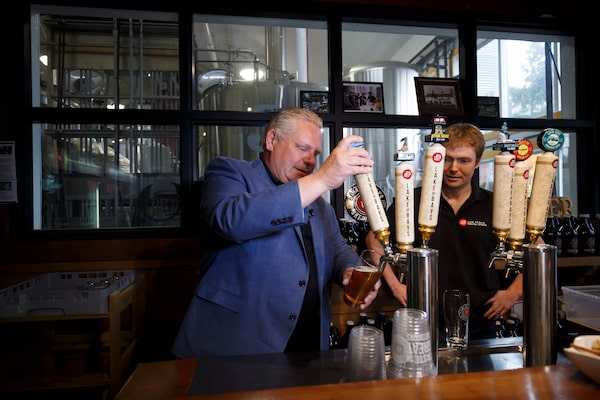
Ontario Premier Doug Ford pours beer from a tap at Lake of Bays Brewing Company in Baysville, Ont., on May 19, 2018.COLE BURSTON/The Canadian Press
The Ontario government is set to announce it is fulfilling its five-year-old promise to allow the sale of beer in corner stores and end the quasi-monopoly of the province’s big-brewer-owned Beer Store retail chain.
A government source has told The Globe and Mail that late next week, Premier Doug Ford’s government will unveil a plan to expand the places where alcohol is sold, including allowing beer in corner stores. The Globe is not identifying the source, as they were not authorized to discuss the matter publicly.
The province will also formally announce its intention for the future of its deal with the Beer Store, known as the “master framework agreement,” signed by the previous Liberal government in 2015. The deal allowed for the limited sale of beer in 450 grocery stores, but maintained the Beer Store’s exclusive right to sell packs of 12 and 24 beers.
The new plan will allow for the privately-owned Beer Store to remain involved in the distribution of beer, as it is now for restaurants, bars and grocery stores, as well as for its own retail locations, the source said.
The source did not provide a timeline for when the changes would take effect. The source said the changes would leave the government’s monopoly Liquor Control Board of Ontario (LCBO) stores, which also sell beer, intact.
The unfulfilled pledge to immediately allow corner stores to sell beer dates back to the first election of Premier Ford’s Progressive Conservatives in 2018. That campaign also saw the populist PC Leader promise a “buck a beer,” and briefly lower the minimum price for suds to that level, although only a few brewers offered such steeply discounted beer.
A larger plan to further loosen Ontario’s post-Prohibition-era rules on alcohol sales was abandoned early in Mr. Ford’s first term, after a battle broke out with the foreign-controlled multinational brewers that run the province’s more than 400 Beer Store outlets.
They warned that breaking their 10-year deal with the government to allow sales in corner stores would result in litigation, and industry sources said violating the agreement could cost the province up to $1-billion in compensation. Mr. Ford retreated from a move to use legislation to wipe out the deal and any provincial liability for breaking it, and the issue went to the back of the beer fridge.
Earlier this year, the Ministry of Finance, which also controls the sale of alcohol in the province, quietly revived talks with the alcohol and convenience store industries as a year-end deadline loomed for the province to declare whether it intended to scrap or renegotiate its deal with the Beer Store, a contract that expires in 2025.
Dave Bryans, the chief executive officer of the Ontario Convenience Stores Association, welcomed word of the announcement. He has been pushing for beer sales for years as a way to revive an industry that has been struggling with declines in tobacco use and lottery ticket sales. He said the changes would be transformative.
“This is the single biggest change convenience stores will have seen since the invention of tobacco,” Mr. Bryans said.
Mr. Bryans said he has no trouble with allowing the Beer Store to retain its distribution role. But he hopes rules will be put in place to guarantee shelf space for Ontario craft brewers and allow them to ship their products directly to local stores.
During the COVID-19 pandemic, Ontario loosened its rules to allow thousands of restaurants to sell take-away alcohol. American convenience chain 7-Eleven has also won liquor licences for locations in the province to serve booze with food sold for consumption within its stores.
Mr. Ford said last month that his government remained committed to allowing beer in corner stores and that talks with the brewers were expected to result in a system that retained a role for the Beer Store.
Neighbouring jurisdictions in Quebec and New York State, as well as elsewhere in the United States, have long allowed beer sales in corner stores. It is also allowed in convenience stores in Newfoundland. In Ontario, beer and alcohol has also been sold in rural areas in some convenience stores with special licences.
Critics of the Beer Store monopoly often point out that while its owners used to be domestic beer companies, it has long been controlled by foreign multinationals.
A number of smaller Ontario-based brewers have in recent years been allowed to become shareholders in the Beer Store. But foreign-controlled giants Molson Coors Brewing Co., headquartered in Denver and Montreal, and Labatt, owned by Belgium’s Anheuser-Busch InBev SA, still nominate a majority of the directors on the company’s board.
 Jeff Gray
Jeff Gray